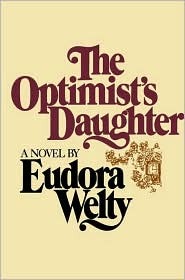The Optimist’s Daughter
 There are many books I read and enjoy, but few that I swoon over. This one, at least in parts, was swoonworthy for the lyrical beauty of its writing and its unmasking of truthful moments. That’s the best way I know how to say it. But the flyleaf testifies to the difficulty others have had in finding words to capture this author’s power. “It is easy to praise Eudora Welty,” says Robert Penn Warren, “but it is not so easy to analyze the elements in her work that make it so easy — and such a deep pleasure — to praise.”
There are many books I read and enjoy, but few that I swoon over. This one, at least in parts, was swoonworthy for the lyrical beauty of its writing and its unmasking of truthful moments. That’s the best way I know how to say it. But the flyleaf testifies to the difficulty others have had in finding words to capture this author’s power. “It is easy to praise Eudora Welty,” says Robert Penn Warren, “but it is not so easy to analyze the elements in her work that make it so easy — and such a deep pleasure — to praise.”
The Optimist’s Daughter has a simple storyline. It follows Laurel Hand home from Chicago to the South for her father’s surgery and, shortly afterward, his death. A night alone in her childhood home brings her face to face with artifacts and realities of her past, and she comes to a deeper understanding of herself and those who are a part of her history. (You can read an excerpt from the book here.)
This novel is the work of an author with deep roots in her place, a keenly attentive eye, and a penetrating, contemplative intelligence. I don’t want to use this post to go into tons of detail or analysis of the story, except to say that this novel is considered autobiographical, and there are some good questions and other materials for exploring this further here under “Resources.” There’s plenty more information on Welty here.
I tend to think, and to file information away, in pictures or symbols. This book contains some compelling ones. I’ll conclude with my favorite from the book, a passage of loving description, and one of several in the story that picks up fictionally on the significance of reading and books discussed in Welty’s autobiography, One Writer’s Beginnings. Who wouldn’t become a lover of books with a history that can be described this way?
When Laurel was a child, in this room and in this bed where she lay now, she closed her eyes like this and the rhythmic, nighttime sound of the two beloved reading voices came rising in turn up the stairs every night to reach her. She could hardly fall asleep, she tried to keep awake, for pleasure. She cared for her own books, but she cared more for theirs, which meant their voices. In the lateness of the night, their two voices reading to each other where she could hear them, never letting a silence divide or interrupt them, combined into one unceasing voice and wrapped her around as she listened, as still as if she were asleep. She was sent to sleep under a velvety cloak of words, richly patterned and stiched with gold, straight out of a fairy tale, while they went reading on into her dreams…


